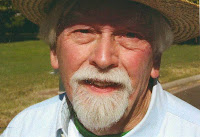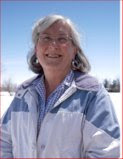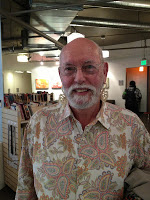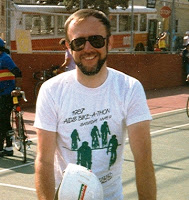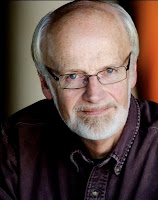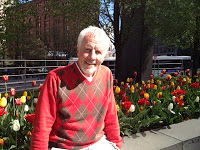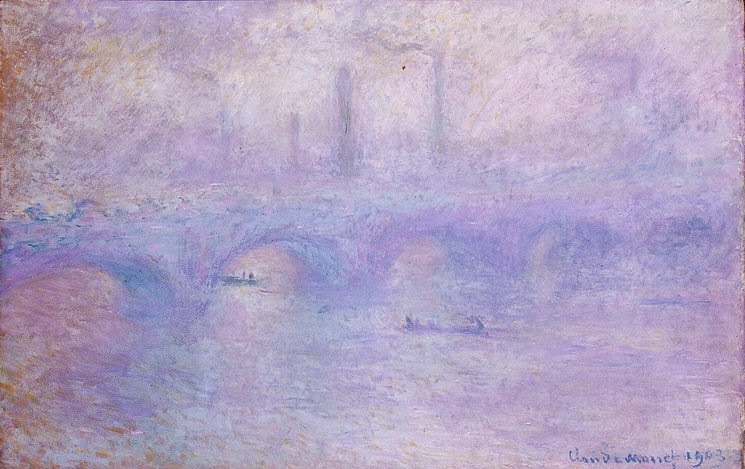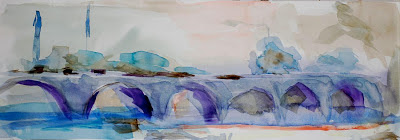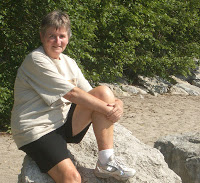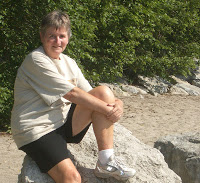As I start this, all I can guarantee is that Grandmother and her
house will not enter into it, nor come to that will Mother except in the sense
of Mother Russia, a phrase used by many older Russians, though perhaps not so
much the younger generation.
The Beginning
In the early 1990s, right after words like glasnost and perestroika
entered our vocabularies, I spent some weeks in Russia as a USAID volunteer.
I worked for a company located right in the middle of Leningrad,
shortly to return to its pre-communist identity of St. Petersburg, on the edge
of the Nyeva river.
I was there towards the end of the year, and for a city located at
roughly the same latitude as Anchorage, Alaska, that’s not the greatest timing.
The Players
Towards the end of my weeks there, the Big Boss, Afanasiy, decided
that we should take a quick overnight trip to their supplier in Helsinki,
Finland. We meant me, Afanasiy and
his second in command Nikoail, and the security manager Vladimir.
The instant
Communism disintegrated, the Mafia and miscellaneous other villains filled in
every nook and cranny of the power vacuum. The ex-Soviet bloc was a dangerous
place and all businesses had so-called Security Guards at every door, all armed
with vicious-looking weapons held ever at the ready.
They were all ex-KGB and they all terrified me.
Nikolai, a delightful young man with humorous crinkly eyes,
sometimes referred sardonically to Vladimir as Vlad, but only behind his back.
I wished he had never done so because it had caused me to make a mental
connection with a certain unlovely historical persona.
Oooh what fun! Endless hours in a car with Vlad the Impaler.
This should have been a boring journey. The whole trip is over flat,
watery country with lots of trees to obscure any view there might be.
But I had already learned that little in Russia is ever boring.
I didn’t know half of it!
The
Transportation
The company was struggling to get off the ground and didn’t yet
rise to things like Company Cars. The next evening we gathered, after work,
around Afanasiy’s old … what? I’m not sure what it was though I am sure about
the “old.” Any logo denoting its make had long since disappeared from a car
body of Swiss cheese.
That thing was
more holes than metal, and what metal remained was dented and rusted.
I thought it was a Lada, or perhaps a Skoda, both very common in
Leningrad at the time, but on our way Nikolai began telling Trabant jokes so
maybe that was it.
Why should a Trabant have a
trunk heater?
So your hands don’t freeze
when you’re pushing it.
What
happens if you apply rust remover to a Trabant?
It
disappears.
How many people do you need to produce a Trabant?
Two. One to fold and one to glue.
I, to my great relief, sat in the back with Nikolai while Afanasiy
drove and Vladimir, quite literally, rode shotgun, or probably more correctly,
rode AK 47.
I was unhappy, however, to find that I had a clear vision of the
road below through a large hole between my feet and another one beside my knee.
I have to say they gave me the best spot, though, as Nikol essentially had to
prop his knees against the seat in front to stop his feet falling out of the
car all together.
It was miserably cold, with wind-blown sleet buffeting the car and
dirty slush splashing constantly onto our legs.
The Ticket
We had barely
reached the outskirts of the city when sirens wailed behind us and Afanasiy
pulled over, plunging us into a deep ditch beside the road. He struggled out
into the slush, and even in the dim light outside I saw a wad of money changing
hands.
And we were on our way.
It seems that there are standard sort of “exit bribes” to get out
of the city, a bit like a toll road you might say. You know you’ll be accused
of speeding and you know just how much it takes to make this imagined
infraction disappear.
Standard practice, not even surreptitiously performed.
The Highway
I might have tried to sleep, but the constant scream of an abused
engine added to the fact that I was in a very short time frozen solid with my
legs encased in an oozing mess of grimy icy slush, made success seem unlikely.
I was disinclined to relax too much anyway, as my horrified
landlady had informed me that this was the most dangerous highway in Russia,
and I imagine it has some pretty steep competition as all Russian drivers treat
their vehicles like bumper cars at the fair.
But, alas, it was not just the combined realities of dreadful
Russian drivers and dreadful Russian weather and dreadful Russian roads, and a
two-lane highway serving an endless stream of trucks ancient and modern between
the nearest point in the East and a newly accessible West.
No, it was the crime rate. I have since read that at that time,
this was the most notorious stretch of highway in the world for murders and hijackings.
So we roared through the night, I would like to say, it has a nice
ring to it, but rather we strained and groaned and choked our way along the
Gulf of Finland, crossing endless little rivers and streams barely moving for the
ice, and heading deeper into deep dark coniferous forests.
The Booze
The three of them were on their third bottle of vodka; one
driving, one becoming maudlin beside me, and one carelessly fingering the
trigger of an assault rifle. And was the safety catch on, or did they even have such things, I wondered, and wished
I hadn’t.
This at least was no surprise to me as they regularly broke open
the first one each day at work around eight in the morning and continued
steadily thereafter.
Nikolai talked of his time as a conscript in the Soviet Army. He
had been among the first troops on the ground after the Chernobyl disaster. No
one had told them anything; they had no protective clothing.
He shrugged in the darkness.
“I will die soon, I think.”
“But not here,” he added with his typical cheer.
“We have Vladimir! Vladimir means immortal.” He chuckled.
“We will not die here!”
I was mighty happy to hear it.
After the fourth vodka bottle made its rounds, Nikolai and
Afanasiy began to sing.
The Russian media had only recently been open to post WW11 Western
entertainment and they seemed to be in a kind of fast-forward mode through it.
They were at
that time in the 60’s which was fine with me, I’m kind of stuck there too!
We reveled in
Beatles hits, and sang happily, if soggilly, through the forests.
The Toilet
I had been contemplating the indignity of screaming toalet, pohshzahloostah, after all I was
in Russia and had lost all hope of dignity, when Afanasyi shouted above various
car/road/weather noises,
“Taolet, dah?”
To be met by a chorus of agreement.
Oh thank you God, I thought. Even on this benighted highway there apparently was
some kind of truck stop of the kind I had been expecting to see, but had not,
every few minutes since we had left the city.
The car swerved suddenly to the edge of the road into a foot of
dirty snow, and came to a halt.
My exaltation collapsed.
The three men scrambled from the car and politely turned their
backs to me, which caused them to be highlighted by the endless stream of passing
headlights.
Zipping himself
up, Afanasyi faced the car and, with a courtly bow and a gesture towards the
trees, yelled,
“Djillian, dah?”
“Dah!” I agreed glumly, and crept from the car.
“What the Hell?” I thought.
“So there’s a foot of snow in the trees. I can’t feel my feet
anyway so, so what?”
I tumbled
thankfully behind a reasonably sturdy tree trunk and ignored the snow, and the
wind, and the endless flow of passing headlights.
Sometimes a girl’s gotta do what a girl’s gotta do!
Taking additional advantage of the stop, I got my overnight bag
from the trunk and put it over the hole in the floor, rested my feet on it and
managed a much more comfortable and considerably drier ride as we progressed.
The Customs
Checks
Next time I woke we were slowing again.
Looking out once more into the blackness, I saw a clearing in the
trees.
A no man’s land from all
those Cold War movies. Really! We’ve all seen them!
Miles of forests and darkness and suddenly – that
clearing, all scrub and snow;
and Soviet agents!
We pulled over to a dark hut with dim lights showing.
This was the first of several, I lost count of them, border
crossings, most just a little shack with a metal arm across the road where a
silent uniform took your passport, looked suspiciously at it and you, grunted,
and returned it.
But at this one the car was searched and
examined in detail. This took a cold miserable hour. We had to empty the car of
every unattached item but the luggage itself was not examined; this apparently
was to be the responsibility of another guard post.
Eventually we went on our way.
Only to pull over a few hundred yards
ahead. Another dreary corrugated metal shed.
The luggage was dispatched onto a rickety
metal table.
We were instructed to empty all pockets.
The Money
My pathetic little pile of banknotes was
counted rapidly with little interest, though the amount was entered solemnly
onto a form I was required to sign.
Russian rubles – 2341.
U.S. dollars – 47
My overnight case was treated with disdain
and barely searched.
Then they opened up the hard-sided case
brought in by Afanasyi and I stopped breathing.
Money.
It was full of money.
Cash, in the form of bundles of U.S.
hundred- and thousand-dollar bills.
Just like in some bank-robbery movie.
The three guards held sub-machine guns and
assault rifles swinging lazily in our direction, the triggers lightly caressed
by fingers controlled, or not, by doubtlessly vodka-sodden brains.
Vladimir clutched his, aimed vaguely in
their direction, in similar fashion.
It was unclear to me whether I was going
to pass out or throw up or both.
In fact I just stood frozen to the spot.
We were dead.
I knew it.
Recalling my landlady’s dire warnings I
knew it.
If I wasn’t immediately mown down by one
or all of the four armed men in the hut, I would be shot on sight by the Mafia
thugs I just knew were about to burst through the door.
Calmly, two of the guards stacked the
mounds of bills on the table and counted.
Each guard openly, casually, pocketed one
bundle.
Another ‘toll” along the road.
Afanasyi signed the form.
U.S. dollars – 1,277,362.
The suitcase was refilled, tossed
carelessly back in the trunk, and we continued into Finland. The only thing we
lost, a great relief to me, was Vladimir’s rifle, which he left at the guard
hut where he would retrieve it on the return journey. He could not take it
across the border.
The Ending
When I regained the power of speech I had
lots of questions.
They shrugged in that typical Russian
manner.
Of course they had to have cash to do
business.
Nobody trusted Russians, or Russia, or its
money.
So cash was king but rubles were
worthless, it had to be German deutschmarks, U.S. dollars, or British pounds.
The Mafia? The gangs? The crimes on this
most dangerous road?
Dah, dah! You never knew. You took your chances.
More shrugged shoulders.
Maybe next week, next month, next year.
Who knew?
I lost contact with them all years ago,
but I choose to believe that they have survived.
I see there is now a high-speed train that
gets you from St. Petersburg to Helsinki in just over two hours, and that
includes what are apparently still lengthy checks at the border.
Do I wish such a train had been available
when I was there, and that we had ridden it that night instead of spending
eight hours of physical and mental anguish on the most dangerous highway in the
world?
No way! After all, who wants to listen to
a story about a two-hour train ride through which I sleep, and nothing worth
recounting ever happens?
About the Author
I
was born and raised in England. After graduation from college there, I moved to
the U.S. and, having discovered Colorado, never left. I have lived in the
Denver-Boulder area since 1965, working for 30 years at IBM. I married, raised
four stepchildren, then got divorced after finally, in my forties, accepting
myself as a lesbian. I have now been with my wonderful partner Betsy for 25
years.
